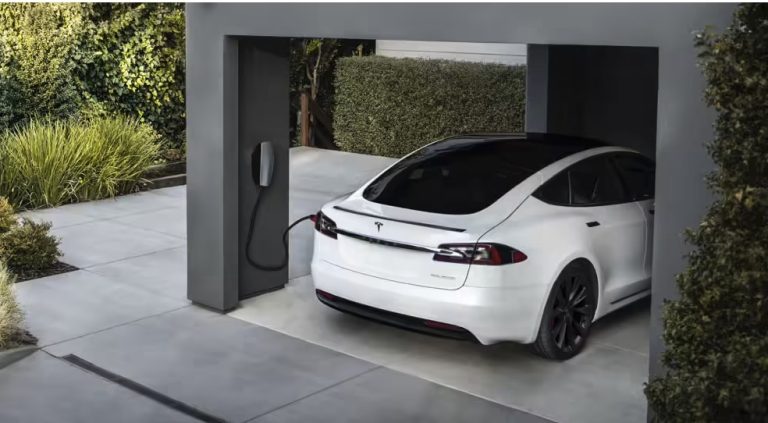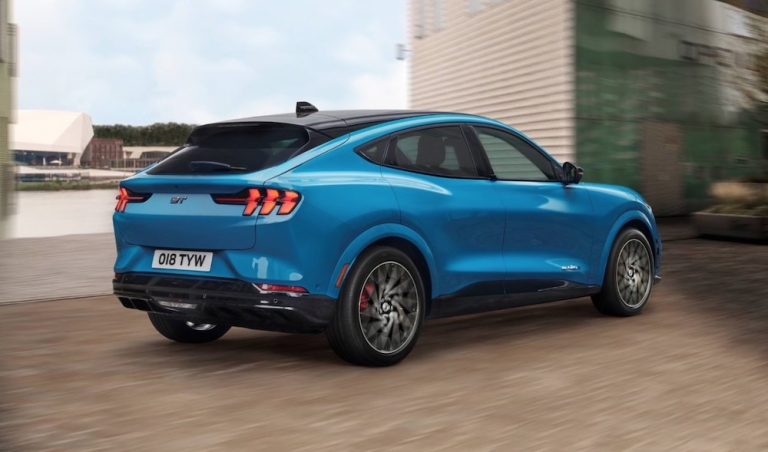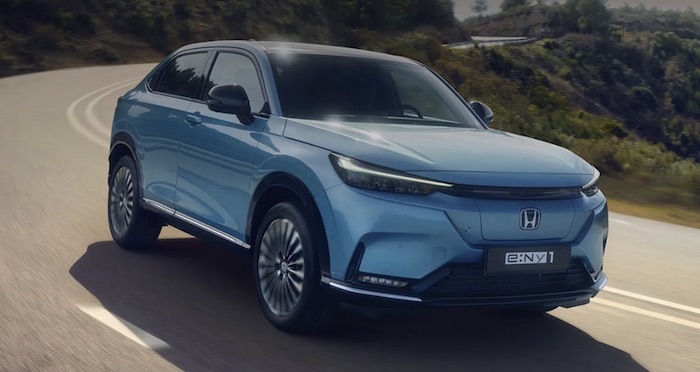Electric Cars: The Basics
For those of you new to zero-emission electric driving, we recommend a read of the following articles:
Sign up to the e-zoomed Electric Living newsletter
The All-Electric BMW iX2 SUV
BMW (Bayerische Motoren Werke AG), is a leading global automotive manufacturer headquartered in Munich, Germany. BMW is well known for its portfolio of luxury vehicles, to include the famed Rolls-Royce luxury cars. The group manufacturers a number of cars under its BMW brand, to include battery-electric vehicles (BEVs) and plug-in hybrid electric vehicles (PHEVs). The company currently has the following portfolio of battery-electric vehicles (BEVs):
- The all-electric BMW iX1
- The all-electric BMW iX2
- The all-electric BMW iX3
- The all-electric BMW iX
- The all-electric BMW i3
- The all-electric BMW i4
- The all-electric BMW i5
- The all-electric BMW i7
Though the first-ever all-electric BMW iX2 and the BMW iX1 SUV have radically different exterior stylings, the electric vehicles (EVs) do have much in common. Both, the iX2 and iX1 premium compact electric SUVs use the UKL platform, which is also shared by the internal combustion engine (ICE) variants.
Given the common heritage, it should not come as a surprise that the iX2 and iX1 offer a very similar EV range and vehicle performance. The iX2 coupé-SUV has a 66.5 kWh high-voltage (48 volt) onboard EV battery, with a claimed electric range up to 431 km (WLTP).
In comparison, the iX1 SUV has a 64.7 kWh EV battery with a claimed range up to 440 km (WLTP). Adjusting for real-world driving conditions, expect the BMW iX2 premium crossover to deliver closer to 360 km on a full EV battery charge. The iX2 has a ‘Max Range’ driving mode, which limits the EVs performance to increase the e-range. The EV has an onboard heat pump to increase the efficiency of the EV.
The electric vehicle (EV) can be DC rapid charged up to 130 kW DC. The EV can achieve a 10%-80% charge in 29 minutes. Interestingly, some of the latest electric SUVs from Chinese automotive manufacturers offer ultra-rapid DC charging capability up to 350 kW DC.
The all-electric Genesis GV60 SUV is a case in point. Having said that, given the smaller size of the onboard EV battery in the iX2 battery-electric vehicle (BEV), a 130 kW DC capability is adequate. At 130 kW DC, 120 km can be added in just 10 minutes!
The e-SUV incorporates as standard, a 11 kW (3-phase) AC onboard charger, which can fully charge the EV in 6 hours and 30 minutes. There is also an option to upgrade to a 22 kW (3-phase) onboard charger. At 22 kW AC the EV battery can be fully charged in 3 hours and 45 minutes.
However, given that most homes in Ireland are restricted to single-phase (7 kW) power supply, it would not be necessary to upgrade to a 22 kW AC onboard charger. Of course, if you do have regular access to 22 kW EV charging, then worth considering the upgrade. Single-phase charging will take longer compared to 3-phase EV charging.
We at e-zoomed recommend a ‘topping up’ approach to EV charging. This way EV charging times are shorter and also better for the long-term maintenance of the onboard EV battery. BMW offers a 8 years or 160,000 km EV battery warranty, similar to what most EV manufacturers offer.
In terms of performance, both, the iX2 and iX1 have commonality. The iX2 has two electric motors (all-wheel drive-AWD), and can achieve 0-100 km/h in 5.6 seconds, with a top speed up to 180 km/h (max power: 313 hp/ torque: 494 Nm). The all-wheel drive (AWD) iX1 can achieve 0-100 km/h in 5.7 seconds, with a top speed up to 180 km/h (max power: 313 hp/ torque: 494 Nm)!
Many of us will be familiar with the internal combustion engine (ICE) X2, which was first shown at the 2016 Paris Motor Show. Even the conventional X2 has been considered to be the more sportier sibling to the conventional BMW X1.
So no surprise, in that, the coupé-SUV exterior styling of the second-generation X2 continues to maintain this distinction to the X1, given the pronounced coupé silhouette of the X2. BMW refers to this coupé silhouette as ‘Sports Activity Coupé (SAC)’.
The iX1 has a 1616mm height, while the iX2 is 1560mm. Despite the reduced height, the rear seats in the iX2 do offer ample headroom for adults! Though both EVs have the same wheelbase (2.6m), the iX2 (4.55m) is just a little longer than the iX1 (4.5m). End result, the iX2 has more boot space on offer, up to 525 L (1,400-litres with the rear seats down). Both the X2 and iX2 are being manufactured at the BMW Group Plant Regensburg (Germany).
In terms of exterior styling, the all-electric iX2 and its showroom stablemate, the X2 internal combustion engine (ICE) look similar, albeit, with some visual changes. As an example, the iX2 features a pair of blanked-off (almost hexagonal) kidney grilles, which can be illuminated! The BMW Iconic Glow contour lighting does not come as standard.
For those new to electric cars, BEVs do not have the need to cool an engine. Hence the reason why the front grille is closed. Moreover, apart from the visual characteristics, it also improves the aerodynamic efficiency of the vehicle. The rear of the iX2 retains the aerodynamic efficiency of the exterior styling. In fact, there is no rear wiper on the EV.
The EV incorporates the BMW curved display, which operates on the latest BMW Operating System 9. There is also a host of technology and driving aids on offer, as standard equipment and as options.
Some of these include: front collision warning system, cruise control with brake function, speed Limit info and lane departure warning, parking assistant (including reversing assist camera and reversing assistant), steering and lane control assistant, active cruise control, active navigation, exit warning function, BMW Head-Up Display, parking assist plus [5] and more!
The EV offers smartphone integration via Apple CarPlay and Android Auto. The EV also offers as an option an electrically operated tow hitch (1,200 kg). Also as an option is a panoramic glass sunroof. The iX2 has yet to be awarded a Euro NCAP rating, but one can expect the EV to achieve a 5-Stars rating.
The EV is suitable for both families and company-car drivers. Bottom-line, electric driving is good for the environment and for the wallet.
| PROS | CONS |
|---|---|
| Attractive coupé-SUV exterior styling | Cheaper electric SUVs available |
| Decent electric range and performance | DC charging limited to 130 kW DC |
| Three-phase (11 kW) AC onboard charger as standard | Only available in one trim at launch |
The All-Electric BMW iX2 SUV (credit: BMW)
| At A Glance | |
|---|---|
| EV Type: | Battery-Electric Vehicle (BEV) |
| Body Type: | SUV |
| Engine: | Electric |
| Available In Ireland: | Yes |
| Variants (1 Option) |
|---|
| BMW iX2 xDrive30 M Sport (from € 70,599) |
| EV Battery & Emissions | |
|---|---|
| EV Battery Type: | Lithium-ion |
| EV Battery Capacity: | Available in one battery size: 66.5 kWh |
| Charging: | 130 kW DC charging (10%-80%: 29 mins). Onboard charger: 11 kW (0%-100%: 6 hrs and 30 mins) |
| Charge Port: | Type 2 |
| EV Cable Type: | Type 2 |
| Tailpipe Emissions: | 0g (CO2/km) |
| EV Battery Warranty: | 8 years or 160,000 km |
| Average Cost Of Residential Charging | |
|---|---|
| Battery net capacity: 16.7 kWh | € 4.00 |
| Battery net capacity: 30.0 kWh | € 7.19 |
| Battery net capacity: 39.2 kWh | € 9.39 |
| Battery net capacity: 45.0 kWh | € 10.78 |
| Battery net capacity: 50.0 kWh | € 11.98 |
| Battery net capacity: 64.0 kWh | € 15.34 |
| Battery net capacity: 71.0 kWh | € 17.01 |
| Battery net capacity: 77.0 kWh | € 18.45 |
| Battery net capacity: 90.0 kWh | € 21.57 |
| Battery net capacity: 100.0 kWh | € 23.97 |
- Note 1: The average cost of residential electricity in Ireland varies depending on the region, supplier and type of energy used. An average for Ireland is 23.97 cents/kWh.
- Note 2: Not all EV manufactures make available the data on net EV battery capacity, and in a number of instances the EV battery capacity advertised, does not state if it is gross or net capacity. In general, usable EV battery capacity is between 85% to 95% of the gross available capacity.
| Charging Times (Overview) | |
|---|---|
| Slow charging AC (3 kW – 3.6 kW): | 6 – 12 hours (dependent on size of EV battery & SOC) |
| Fast charging AC (7 kW – 22 kW): | 3 – 8 hours (dependent on size of EV battery & SoC) |
| Rapid charging AC (43 kW): | 0-80%: 20 mins to 60 mins (dependent on size of EV battery & SoC) |
| Rapid charging DC (50 kW+): | 0-80%: 20 mins to 60 mins (dependent on size of EV battery & SoC) |
| Ultra rapid charging DC (150 kW+): | 0-80% : 20 mins to 40 mins (dependent on size of EV battery & SoC) |
| Tesla Supercharger (120 kW – 250 kW): | 0-80%: up to 25 mins (dependent on size of EV battery & SoC) |
- Note 1: SoC: state of charge
| Dimensions | |
|---|---|
| Height (mm): | 1560 |
| Width (mm): | 1845 |
| Length (mm): | 4554 |
| Wheelbase (mm): | 2692 |
| Turning Circle (m): | N/A |
| Boot Capacity (L): | 525 |
| BMW iX2 xDrive30 | |
|---|---|
| EV Battery Capacity: | 66.5 kWh |
| Pure Electric Range (WLTP): | 418 – 431 km |
| Electric Energy Consumption (kWh/100km): | 17.0 – 17.7 |
| Charging: | 130 kW DC charging (10%-80%: 29 mins). Onboard charger: 11 kW (0%-100%: 6 hrs and 30 mins) |
| Top Speed: | 180 km/h |
| 0-100 km/h: | 5.6 seconds |
| Drive: | All-wheel drive (AWD) |
| Electric Motor (kW): | 230 |
| Max Power (hp): | 313 |
| Torque (Nm): | 494 |
| Transmission: | Automatic |
| Seats: | 5 |
| Doors: | 5 |
| Unladen Weight-EU (kg): | 2,095 |
| Colours: | 10 |
| NCAP Safety Rating: | N/A |
Solar And EV Charging: An Overview
The benefits of renewable energy, in particular, solar and wind energy, is already well established in Ireland and in other parts of the world. With the increase in sales of electric vehicles (EVs) over the past three years, the advantages of using clean and renewable energy has been further enhanced.
Firstly, on-site renewable energy systems can be used for powering, both, business premises and homes. For on-site generation, we have witnessed a significant increase in distributed clean energy generating plants i.e. many commercial buildings and residential buildings have become generators i.e. generating electricity on-site! Solar roof projects have been popular for such on-site generation installations.
The war in Ukraine has further amplified the need to develop energy security, not only at a national level, but also at a local level, to include, businesses and households. Those households and businesses that already generate and consume clean energy on-site have been spared the significant onslaught of energy price rise in 2022 and 2023.
Installing solar panels on-site, mitigates the risks associated with energy price inflation, a significant contributor to costs for a business or a household. On-site renewable energy generation also impacts the environment positively. For those with electric vehicles (EVs), in particular, pure electric vehicles, we strongly encourage the use of renewable energy for EV charging. Of course, we also encourage the use of solar energy for charging a plug-in hybrid electric vehicle (PHEV).
Apart from the significant cost benefit i.e. generating renewable energy is a nominal cost per kWh (after initial set-up/ installation costs), to achieve true zero-tailpipe emission electric driving, renewable energy needs to be used for EV charging. This is also known as ‘well-to-wheel’. Just one electric car on the road can save an average of 1.5 million grams of CO2.
The good news for electric car owners is that a number of EV charging stations are now compatible with solar/ wind generation and battery storage. The UK based manufacturer myenergi zappi is a good example of a solar/ wind compatible EV charger.
We encourage business and households to adopt an on-site ecosystem of ‘renewable energy-battery storage-EV charging’, to gain the maximum from the advantages of low carbon generation and zero-emission electric driving. Bottom-line, renewable energy is good for the environment and the wallet!
While e-zoomed uses reasonable efforts to provide accurate and up-to-date information, some of the information provided is gathered from third parties and has not been independently verified by e-zoomed. While the information from the third party sources is believed to be reliable, no warranty, express or implied, is made by e-zoomed regarding the accuracy, adequacy, completeness, legality, reliability or usefulness of any information. This disclaimer applies to both isolated and aggregate uses of this information.





























